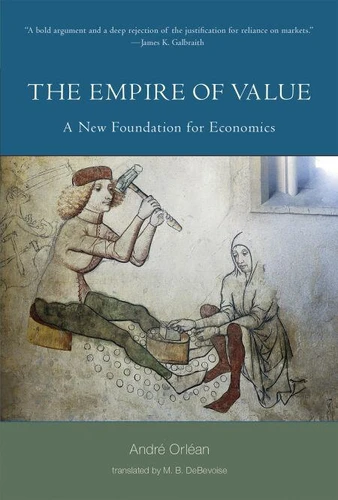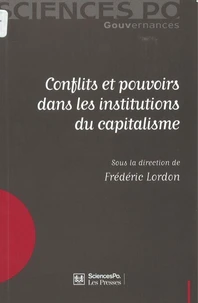The Empire of Value. A New Foundation for Economics
Par : ,Formats :
Disponible dans votre compte client Decitre ou Furet du Nord dès validation de votre commande. Le format ePub protégé est :
- Compatible avec une lecture sur My Vivlio (smartphone, tablette, ordinateur)
- Compatible avec une lecture sur liseuses Vivlio
- Pour les liseuses autres que Vivlio, vous devez utiliser le logiciel Adobe Digital Edition. Non compatible avec la lecture sur les liseuses Kindle, Remarkable et Sony
- Non compatible avec un achat hors France métropolitaine
 , qui est-ce ?
, qui est-ce ?Notre partenaire de plateforme de lecture numérique où vous retrouverez l'ensemble de vos ebooks gratuitement
Pour en savoir plus sur nos ebooks, consultez notre aide en ligne ici
- Nombre de pages360
- FormatePub
- ISBN978-0-262-32391-8
- EAN9780262323918
- Date de parution06/06/2014
- Protection num.Adobe DRM
- Taille1 Mo
- Infos supplémentairesepub
- ÉditeurThe MIT Press
Résumé
An argument that conceiving of economic value as a social force makes it possible to develop a new and more powerful theory of market behavior. With the advent of the 2007-2008 financial crisis, the economics profession itself entered into a crisis of legitimacy from which it has yet to emerge. Despite the obviousness of their failures, however, economists continue to rely on the same methods and to proceed from the same underlying assumptions.
André Orléan challenges the neoclassical paradigm in this book, with a new way of thinking about perhaps its most fundamental concept, economic value. Orléan argues that value is not bound up with labor, or utility, or any other property that preexists market exchange. Economic value, he contends, is a social force whose vast sphere of influence, amounting to a kind of empire, extends to every aspect of economic life.
Markets are based on the identification of value with money, and exchange value can only be regarded as a social institution. Financial markets, for example, instead of defining an extrinsic, objective value for securities, act as a mechanism for arriving at a reference price that will be accepted by all investors. What economists must therefore study, Orléan urges, is the hold that value has over individuals and how it shapes their perceptions and behavior.
Awarded the prestigious Prix Paul Ricoeur on its original publication in France in 2011, The Empire of Value has been substantially revised and enlarged for this edition, with an entirely new section discussing the financial crisis of 2007-2008.
André Orléan challenges the neoclassical paradigm in this book, with a new way of thinking about perhaps its most fundamental concept, economic value. Orléan argues that value is not bound up with labor, or utility, or any other property that preexists market exchange. Economic value, he contends, is a social force whose vast sphere of influence, amounting to a kind of empire, extends to every aspect of economic life.
Markets are based on the identification of value with money, and exchange value can only be regarded as a social institution. Financial markets, for example, instead of defining an extrinsic, objective value for securities, act as a mechanism for arriving at a reference price that will be accepted by all investors. What economists must therefore study, Orléan urges, is the hold that value has over individuals and how it shapes their perceptions and behavior.
Awarded the prestigious Prix Paul Ricoeur on its original publication in France in 2011, The Empire of Value has been substantially revised and enlarged for this edition, with an entirely new section discussing the financial crisis of 2007-2008.
An argument that conceiving of economic value as a social force makes it possible to develop a new and more powerful theory of market behavior. With the advent of the 2007-2008 financial crisis, the economics profession itself entered into a crisis of legitimacy from which it has yet to emerge. Despite the obviousness of their failures, however, economists continue to rely on the same methods and to proceed from the same underlying assumptions.
André Orléan challenges the neoclassical paradigm in this book, with a new way of thinking about perhaps its most fundamental concept, economic value. Orléan argues that value is not bound up with labor, or utility, or any other property that preexists market exchange. Economic value, he contends, is a social force whose vast sphere of influence, amounting to a kind of empire, extends to every aspect of economic life.
Markets are based on the identification of value with money, and exchange value can only be regarded as a social institution. Financial markets, for example, instead of defining an extrinsic, objective value for securities, act as a mechanism for arriving at a reference price that will be accepted by all investors. What economists must therefore study, Orléan urges, is the hold that value has over individuals and how it shapes their perceptions and behavior.
Awarded the prestigious Prix Paul Ricoeur on its original publication in France in 2011, The Empire of Value has been substantially revised and enlarged for this edition, with an entirely new section discussing the financial crisis of 2007-2008.
André Orléan challenges the neoclassical paradigm in this book, with a new way of thinking about perhaps its most fundamental concept, economic value. Orléan argues that value is not bound up with labor, or utility, or any other property that preexists market exchange. Economic value, he contends, is a social force whose vast sphere of influence, amounting to a kind of empire, extends to every aspect of economic life.
Markets are based on the identification of value with money, and exchange value can only be regarded as a social institution. Financial markets, for example, instead of defining an extrinsic, objective value for securities, act as a mechanism for arriving at a reference price that will be accepted by all investors. What economists must therefore study, Orléan urges, is the hold that value has over individuals and how it shapes their perceptions and behavior.
Awarded the prestigious Prix Paul Ricoeur on its original publication in France in 2011, The Empire of Value has been substantially revised and enlarged for this edition, with an entirely new section discussing the financial crisis of 2007-2008.
















